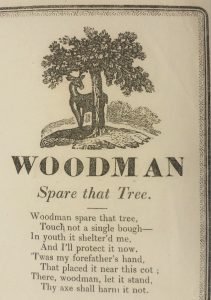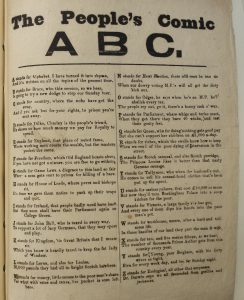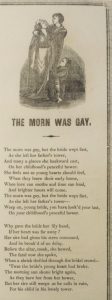December 1, 2017, by Kathryn Steenson
Ballads at KMC
This is a guest post by Clare Clarke, a former volunteer librarian.
 As a volunteer I have had the privilege to work with a range of fascinating collections, including material from the French Revolution, Fred Westacott pamphlets and works on or by D.H. Lawrence donated by the family of Emile Delavenay, a French academic.
As a volunteer I have had the privilege to work with a range of fascinating collections, including material from the French Revolution, Fred Westacott pamphlets and works on or by D.H. Lawrence donated by the family of Emile Delavenay, a French academic.
My most recent task has been to categorize two scrapbooks of ballads in preparation for cataloguing. These poems date mainly from the eighteenth and nineteenth centuries, although there are few dates, and have been extracted from other literary sources and glued on to sheets. The aim was to divide the contents into smaller units ( 7-8) with no more than 90 titles in each section. One of the sections needed to be East-Midlands related, and this was largely a clearly designated section. The remainder could be separated by topic or any other common feature.
The first task was to read the ballads to get an idea of the subject matter and, in parallel, I investigated the most common poetry themes. Once I had studied both volumes, I decided on some suitable thematic categories. In addition to the Local ballads, the final choices were:
- Love and Attachment;
- Romantic and comic yarns;
- Social commentary (quite a broad category to include thoughts and morals, milestones and memories, politics and religion and nature);
- Places;
- People at Work or at Leisure;
- Conflict and Loss (and Sea poems).
 I allocated specific letters for each category to write against each title on the Contents pages. I then added up the number of titles in each section to ensure they did not outnumber the required amount.
I allocated specific letters for each category to write against each title on the Contents pages. I then added up the number of titles in each section to ensure they did not outnumber the required amount.
There were some challenges during the process: when there was more than one poem per sheet, often with different topics, it was necessary to choose one more dominant ballad for the theme or a category which might be appropriate for all or most of them. Many of the poems had a romantic theme, so having too many titles for a single unit, I created another category of Romantic Yarns, tales of often amusing romantic entanglements and their consequences, leaving the Love and Attachment subset for more general eulogies.
The poems vary vastly in style, with some being beautiful and moving, others comic and slightly risqué. There are wonderful historical details, social and political commentaries, poems of war and loss. On reading these rich ballads, it was a constant reminder of the eternal themes of humanity: Fashions, customs and politics may evolve, but human frailties and emotions remain unchanged.
I have picked out a few favourites, very varied in style and content, which I can highly recommend:
 The Poor Old Man I chose for its pathos and talk of regret of the passing years “They tell me he once was as young, as gay and as cheerful as I” and “He thought, a few winters ago old age was a great while to come”. The People’s Comic ABC I liked for its bold political and social commentary, for example, G stands for Game Laws, “a disgrace to this land so fair where a man gets sent to prison for the killing of a hare”, or perhaps even more daring: “U stands for useless palaces”. The He She Lady’s Maid is a good example of the many comic Romantic Yarns in the collection and it is difficult not to appreciate the dry, ironic humour of the ballad. The title reveals to a large extent the comic content of the poem. The author describes the intimate duties of a lady’s maid: “He used to take her stockings off and help her into bed” and the writer expresses false astonishment that the maid carried out all these tasks and was actually a man all the while. It “made…the servants grin “although “They solemnly declared they thought the lady may have seen his whiskers or his beard”. Woodman Spare That Tree is a beautiful and heartfelt ode to an old oak tree where the poet remembers “that old familiar tree”, a presence throughout his life, and so makes a plea to the woodman to save it and thus his memories. Finally, I was moved by The Morn Was Gay, a poignant lament about a daughter who leaves the family home. The daughter weeps as she gets married – “She feels not as as young hearts should feel when they leave their early home” and her anguish is shared by her father as “he calls in vain for his child in his lonely tower”.
The Poor Old Man I chose for its pathos and talk of regret of the passing years “They tell me he once was as young, as gay and as cheerful as I” and “He thought, a few winters ago old age was a great while to come”. The People’s Comic ABC I liked for its bold political and social commentary, for example, G stands for Game Laws, “a disgrace to this land so fair where a man gets sent to prison for the killing of a hare”, or perhaps even more daring: “U stands for useless palaces”. The He She Lady’s Maid is a good example of the many comic Romantic Yarns in the collection and it is difficult not to appreciate the dry, ironic humour of the ballad. The title reveals to a large extent the comic content of the poem. The author describes the intimate duties of a lady’s maid: “He used to take her stockings off and help her into bed” and the writer expresses false astonishment that the maid carried out all these tasks and was actually a man all the while. It “made…the servants grin “although “They solemnly declared they thought the lady may have seen his whiskers or his beard”. Woodman Spare That Tree is a beautiful and heartfelt ode to an old oak tree where the poet remembers “that old familiar tree”, a presence throughout his life, and so makes a plea to the woodman to save it and thus his memories. Finally, I was moved by The Morn Was Gay, a poignant lament about a daughter who leaves the family home. The daughter weeps as she gets married – “She feels not as as young hearts should feel when they leave their early home” and her anguish is shared by her father as “he calls in vain for his child in his lonely tower”.
I have thoroughly enjoyed the task of reading and categorizing this collection of ballads. Once the collection is catalogued, I hope this will then improve access to them and enable many more readers to enjoy them too.
No comments yet, fill out a comment to be the first

Leave a Reply